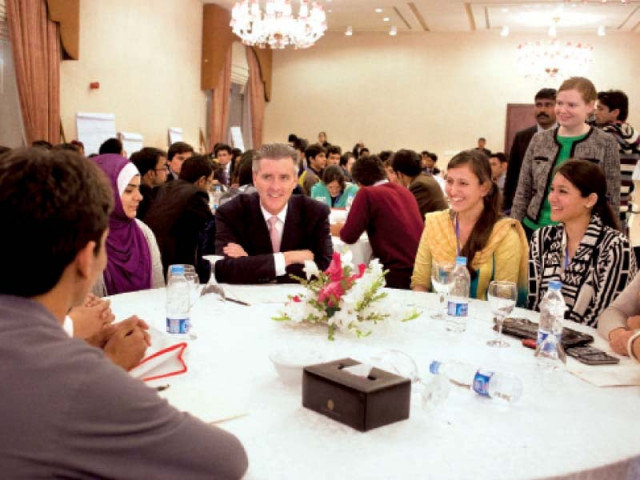Undergrads going to US for a semester share their aspirations
The 100 students are from across the country.

Twenty-year-old Najeebullah has never seen the world outside Pakistan, much like 99 other undergraduates — teeming with excitement — around him at a pre-departure orientation session on Friday.
During its two-year tenure, the United States Education Foundation in Pakistan’s (USEFP) Global UGRAD program has given over 400 students across Pakistan a life-changing opportunity to spend a semester at a university in the United States.
Najeebullah, who is from Balochistan, studies Political Science at Government College University (GCU), Lahore. He will be shipping off to Eastern Washington University in January with high hopes.
“There is more diversity in the United States than there is in Pakistan,” he said, tall and confident. “Why is it that we Pakistanis, with far less differences, cannot seem to live as one?”
Najeebullah believes that education is the cure for sectarian violence in Balochistan. “When people have time on their hands, it is easy to pick up a gun.”
The young scholar, whose parents were illiterate, has big aspirations. “CSS,” he is quick to answer, when investigated about future plans. “Not streamlined politics, but honest civil service.”
Fatima Khalid, who is in her third year of chemical engineering at the National University of Science and Technology (NUST), calls this opportunity an “adventure”.

“This is a chance to challenge my own tolerance in the face of different ideas, religions and cultures,” she said.
Arifa, 21, is curious about the learning-centric model of education in the United States, unlike her college in Gilgit-Baltistan, where she feels teachers influence learning without encouraging personal enterprise.
Raj Kumar, 20, is set to attend Juniata College in Pennsylvania for business studies. “In Umerkot, people are reluctant to educate their children because of poverty and lack of job opportunities,” he said. His father, who was a primary school teacher, is proud of his son’s tenacity towards a brighter future and one that benefits the people around him.
The 22-year-old Umar Nisar wants to change the world’s perception of his hometown. “We are not all extremists,” the young man from the troubled Mohmand Agency asserted, hoping that he would get a chance to convey this message to the friends he makes while studying at Graceland University in Iowa. Having grown up around the uncertainty of transport, relentless curfews, army patrol and the scent of fear, Nisar wants to reiterate his suffering to others and to share his humanity.
There are over 750,000 international students attending colleges in the United States and they interact to create what US Ambassador Richard Olsen described as a kind of “marvellous chemistry”, which serves to break stereotypes, gives birth to great ideas and creates long-lasting friendships.
The group, selected on the merit of their applications, consists of 31 students from Punjab, 25 from Khyber-Pakhtunkhwa, 22 from Sindh, 17 from Gilgit-Baltistan, four from FATA, five from the Islamabad Capital Territory, seven from Balochistan and two from Azad Jammu and Kashmir.
Published in The Express Tribune, December 15th, 2012.



















COMMENTS
Comments are moderated and generally will be posted if they are on-topic and not abusive.
For more information, please see our Comments FAQ